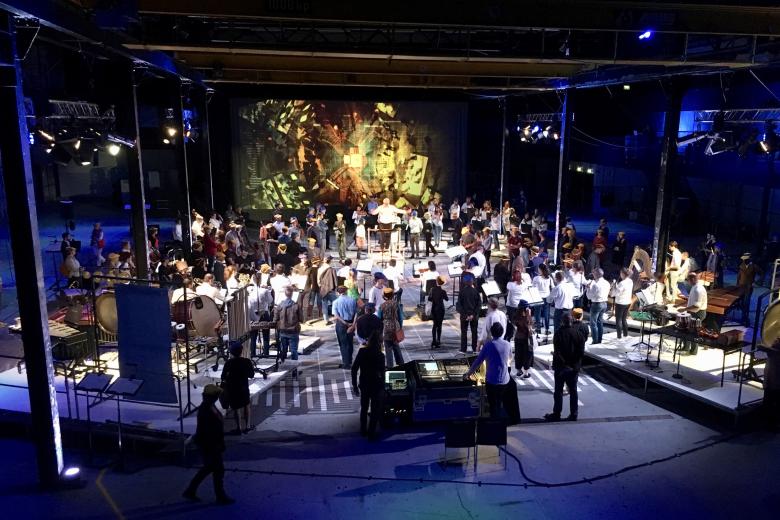MCICM Research
MCICM Research lines
The regional orchestra
As a regional orchestra, philzuid must balance its artistic ambitions (excellent performances of the core repertoire) against regional relevance. The orchestra shares this balancing act with other regional orchestras at home and abroad. Through practice-oriented research into regional ecologies of classical music, the orchestra can learn from best practices elsewhere. In this research, MCICM collaborates with the Sheffield Performing Arts Research Center (SPARC) of Sheffield University. The research focuses on the regional impact created by collaboration between conservatories, orchestras, chamber music ensembles, and knowledge institutions in a number of British and European cities and regions.
Renewal of classical music practice requires a change in the role of musicians and staff in the organization of an orchestra. This not only questions the core values of the musician's craft, but also touches on the skills required to fulfill various roles within a learning orchestra. The research collects best practices and organizes and reflects on practical experiments that can support change processes in the orchestra.
Lead researchers
Prof. dr. Peter Peters and dr. Veerle Spronck
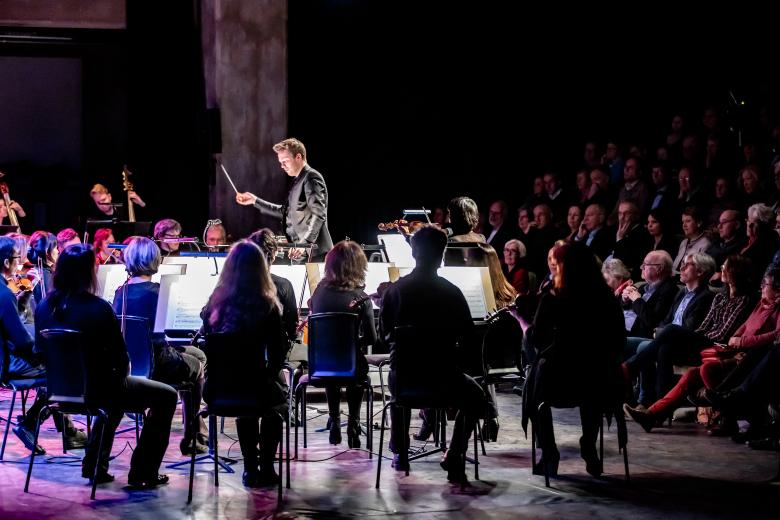
Innovating higher music education
Conservatorium Maastricht not only wants to train students to become excellent musicians (craft, artistry), but also prepare them for a practice that is undergoing major changes (relevance, innovation, reflection). The MCICM research supports the connection with professional practice based on the following themes:
innovative curriculum: coordination of music training and professional practice
artistic research: musicians of tomorrow as reflective practitioners
The current curriculum focuses primarily on the individual artistic development of students by main subject teachers and thus on the first educational goal. To achieve the second goal, reform of the curriculum is necessary (leadership development, reflective skills) and a reassessment of the role of the (main subject) teachers. Design-oriented research provides ideas and guidelines for the development of the (MA) curriculum to ensure that higher music education is optimally aligned with developments in the labor market. Students and teachers from the conservatory as well as musicians and staff members from the philzuid are actively involved in this research. The aim is a course that challenges students to investigate how they can use their unique talents in an innovative way in a hybrid professional practice. Practical projects and co-creation are important methods to contribute to support for the paradigm shift that is required.
Lead researchers
Prof. dr. Peter Peters and Dr. Denise Petzold
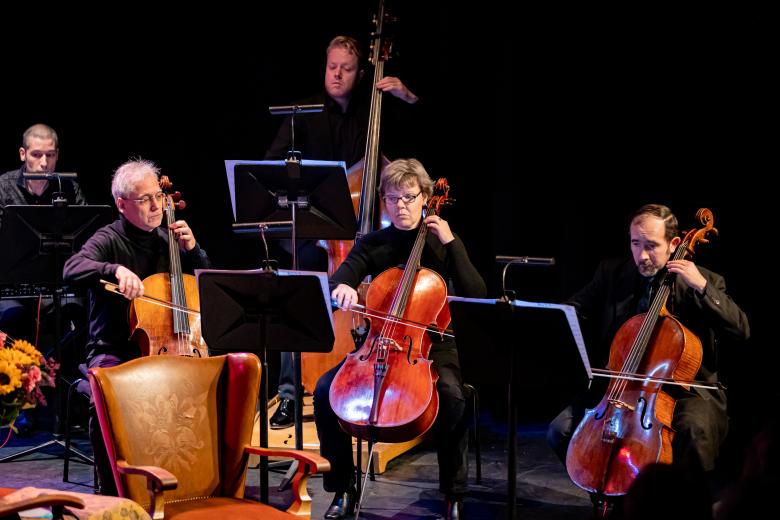
Orchestrating social relevance
Classical music as an art form has always reflected and interacted with the societal context in which it developed. What does this mean for classical music in 21st century societies? How do societal changes, e.g. the focus on experiences in what is called the ‘experience society’ have an impact on classical music as a practice? And how can classical music institutions, and especially the symphony orchestra, have an impact on societal issues such as social cohesion or regional development? These questions were explored by studying how musical artefacts, institutions and practices operate as socially and politically shaping forces, both historically and in contemporary societies.
The MCICM studied these topics not in a vacuum, but by mobilizing its location in the Euregion. This region is characterized by a tension between the ambition to be an internationally oriented knowledge region, and the desire of many to rediscover and nurture the cultural character of their own cities and regions. This tension offers possibilities to experiment with encounters between musical worlds of people of differing social and cultural backgrounds and the role the symphony orchestra could play in this. In order to organize these experiments, innovative research designs were developed, drawing not only on academic research, but also on approaches from design research and artistic research. This approach resonated with what has been labeled ‘embedded humanities’, humanities research that co-evolves with practical problems.
To explore more about MCICM’s research, please visit www.artfulparticipation.nl.
Lead researchers
Dr. Ruth Benschop, Imogen Eve, Prof. dr. Peter Peters, dr. Neil T. Smith and dr. Ties van de Werff
Publications
Peters, P.F., T. van de Werff, R. Benschop and I. Eve. (2021). Artful innovation: How to experiment in symphonic music practice. In Chaker, Sarah & Petri-Preis, Axel (eds.), Tuning Up – Innovative Potentials of Musikvermittlung (pp. 179-198). Transcript Verlag. https://doi.org/10.14361/9783839456811-014
Eve, I. (2020). The Same but Differently. Maastricht: Lectoraat AOK, Zuyd Hogeschool/MCICM. https://www.maastrichtuniversity.nl/file/mcicmthe-same-differently-8pdf
Peters, P. F. (2022). Achter de schermen. de Klank. Magazine van orkest en vrienden philharmonie zuidnederland, 9(4), 45. https://www.maastrichtuniversity.nl/behind-scenes
Peters, P. F. (2022). Musici van Morgen. de Klank. Magazine van orkest en vrienden philharmonie zuidnederland, 9(3), 46. https://www.maastrichtuniversity.nl/musicians-tomorrow
Peters, P. F. (2019). Anders luisteren naar Beethoven. de Klank. Magazine van orkest en vrienden philharmonie zuidnederland, 7(2), 45. https://www.maastrichtuniversity.nl/listening-beethoven-differently
Peters, P.F. & T. van de Werff. (2020). Digitale flessenpost. de Klank. Magazine van orkest en vrienden philharmonie zuidnederland, 8(1), 23. https://www.maastrichtuniversity.nl/digital-message-bottle
Peters, P.F. & T. van de Werff. (2021). Een lerend orkest. de Klank. Magazine van orkest en vrienden philharmonie zuidnederland, 8(2), 26. https://www.maastrichtuniversity.nl/learning-orchestra
Peters, P.F., Rosu, S. & Benschop, R. (2020). The Researching Orchestra: Innovative collaborations between symphonic orchestras and knowledge institutions. In Tröndle, M. (Ed.). Classical Concert Studies: A Companion to Contemporary Research and Performance (pp. 342-350). London: Routledge/Taylor & Francis Group. https://www.taylorfrancis.com/chapters/edit/10.4324/9781003013839-42/researching-orchestra-christoph-seibert-jutta-toelle-melanie-wald-fuhrmann
Peters, P.F., I. Eve & T. van de Werff. (2020). Hoe klinkt Maastricht Noordwest? de Klank. Magazine van orkest en vrienden philharmonie zuidnederland, 7(4), 39. https://www.maastrichtuniversity.nl/how-does-maastricht-northwest-sound
Peters, P.F., T. van de Werff & I. Eve. (2020). Een salon voor de vrienden. de Klank. Magazine van orkest en vrienden philharmonie zuidnederland, 7(3), 26. https://www.maastrichtuniversity.nl/peoples-salon
Peters, P.F. (2019). Het orkest als laboratorium. de Klank. Magazine van orkest en vrienden philharmonie zuidnederland, 6(4), 30.
Peters, P.F. (2019). Mahler aan de stamtafel. de Klank. Magazine van orkest en vrienden philharmonie zuidnederland, 7(1), 61.
Peters, P., van de Werff, T., Eve, I., & Roeden, J. (2023). Doing Collaborative Research on Symphonic Orchestra Audiences: Interventionist Ethnography of Music Practices. In K. Bijsterveld, & A. Swinnen (Eds.), Interdisciplinarity in the Scholarly Life Cycle : Learning by Example in Humanities and Social Science Research (pp. 253-271). Palgrave Macmillan. https://doi.org/10.1007/978-3-031-11108-2_14
Smith, N. T. and P.F. Peters (2023). ‘Music and Buildings’. In Dromey, Chris (ed.) The Routledge Companion to Applied Musicology. London: Routledge. https://www.taylorfrancis.com/chapters/edit/10.4324/9781003042983-33/music-buildings-building-music-neil-smith-peter-peters
Smith, N. T. (2022). Het publiek als proefkonijn. de Klank. Magazine van orkest en vrienden philharmonie zuidnederland, 10(1), 33. https://www.maastrichtuniversity.nl/audience-test-subject
Smith, N. T. (2022). Contested Materials: Concrete and Stone in David Chipperfield Architects’ New Concert Hall for Edinburgh. In Rydin, Y., Beauregard, R.A., Lieto, L. and Cremaschi, M. (Eds.). Regulation and Planning: Practices, Institutions, Agency (pp. 56-67). Routledge. https://www.routledge.com/Regulation-and-Planning-Practices-Institutions-Agency/Rydin-Beauregard-Cremaschi-Lieto/p/book/9780367559557
Smith, N. T. (2021). Constructing the Public Concert Hall. Journal of the Royal Musical Society. https://www.cambridge.org/core/journals/journal-of-the-royal-musical-association/article/constructing-the-public-concert-hall/F85B59D0ABB9E04C0D9DE4F6B9549D90?utm_campaign=shareaholic&utm_medium=copy_link&utm_source=bookmark
Smith, N. T. (2021). Concrete Culture: The Planning Hearing as a Stage for Cultural Debates New Concert Hall for Edinburgh. Cultural Sociology. https://doi.org/10.1177/17499755211040959
Smith, N.T. (2020). Performing in winter: creating COVID-safe super venues and sharing the stage. In The Conversation. Retrieved from https://theconversation.com/performing-in-winter-creating-covid-safe-super-venues-and-sharing-the-stage-145885
Smith, N. T. (2021). Gebouwde muziek. de Klank. Magazine van orkest en vrienden philharmonie zuidnederland, 7(3), 26.
https://www.maastrichtuniversity.nl/concert-hall-and-orchestra
Werff, T. van de., Molina, K. & Peters, P.F., (2021). Artful Participation. Experiments in Audience Participation. https://artfulparticipation.nl/
Werff, T. van de, Smith, N.T., Rosu, S. & Peters, P.F. (2021). Missing the Audience. Online musicking in times of Covid-19. Journal of Cultural Management and Cultural Policy, 2021(1), 137-150. https://doi.org/10.14361/zkmm-2021-0107
Werff, T. van de (2020). Een tijdelijk en gretig publiekje. Retrieved from: http://corona-kunst.nl/ties-van-de-werff-een-tijdelijk-en-gewillig-publiekje/
Werff, T. van de, and I. Pasmans. (2019) Music in the Making: an open and collaborative experiment at Conservatorium Maastricht. In Sætre, Jon Helge & Gies, Stefan (eds.), Centre for Excellence in Music Performance Education publication series, Oslo: Norwegian Academy of Music. https://nmh.brage.unit.no/nmh-xmlui/bitstream/handle/11250/2642235/Becoming_Musicians_Gies_%26_Saetre_%28Eds.%29_web.pdf?sequence=1&isAllowed=y
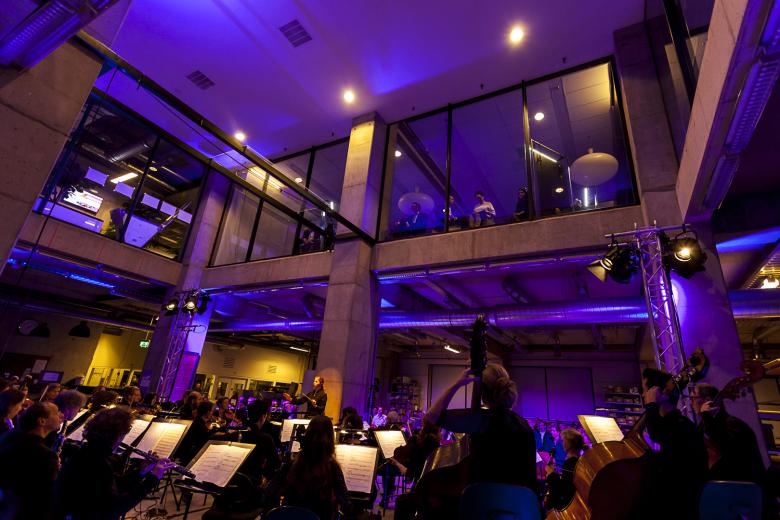
Modernising cultural participation
Whereas classical music has always renewed itself as an art form, the presentation or staging of this art form in concert halls before attentive listeners has more or less remained unchanged since the nineteenth century. More than in any other art form, the listener to live classical music seems to be passive: silent and immobile. Many have identified this style of listening as an important reason for the declining interest in classical music concerts. How can we rethink and innovate the ways in which audiences participate in classical music concerts? Recent studies and experiments in audience development and participation have focused on digital technologies to enhance the quality of the concert experience.
People are guided through a performance, audiences can get an impression of a piece before a concert, and revisit it after the concert was played. This raises questions: how do digital technologies give rise to new aesthetic forms, and how can digital aesthetics provide a structure for the social and cultural participation of concert audiences? Recent research on cultural participation suggests that new technological mediations of classical music concerts do not automatically lead to developing the cultural competences that allow audiences to give meaning to classical music and relate it to their own situations. This research line connects to a broader body of critical Science & Technology Studies (STS) research that aims at unpacking the notion of ‘participation’, and the role that digital technologies play in enabling it, while at the same time using insights from this research to develop creative futures for classical symphonic music.
Lead reseachers
Dr. Ruth Benschop, Prof. dr. Peter Peters and dr. Veerle Spronck
Publications
Spronck, V. (2022). Listen closely: Innovating audience participation in symphonic music. [Doctoral Thesis, Maastricht University]. Maastricht University. https://doi.org/10.26481/dis.20220706vs
Spronck, V. (2022). Beethoven as open dialogue: Doing participation differently in symphonic music? In: Benschop, R., Rausch, C., Sitzia, E. and Van Saaze, V. (Eds.). Participatory Practices in Arts and Heritage: Learning Through and from Collaboration. Springer. https://link.springer.com/book/10.1007/978-3-031-05694-9
Spronck, V. (2021). Luisteren als een etnograaf. de Klank. Magazine van orkest en vrienden philharmonie zuidnederland, 8(3), 45. https://www.maastrichtuniversity.nl/listening-etnographer
Spronck, V. (2020). We dreigen het cultuurpubliek te vergeten. Trouw, 27 April. https://www.trouw.nl/opinie/we-dreigen-het-cultuurpubliek-te-vergeten~b55a6667/
Spronck, V. (2019). A Laboratory for Performance Practice: The Case of MusicExperiment21,In: P. De Assis & L. D’Errico (Eds.). Artistic Research: Charting a Field in Expansion,Washington DC: Rowman & Littlefield. https://rowman.com/ISBN/9781786611499/Artistic-Research-Charting-a-Field-in-Expansion
Spronck, V., Peters, P.F. & Werff, T. van de. (2021). Empty Minds: Innovating Audience Participation in Symphonic Practice. Science as Culture, 30(2), 216-236. (Special Issue on Experimenting Participatory Innovation). DOI: 10.1080/09505431.2021.1893681
Van de Werff, T. Eve, I. & Spronck, V. (2023) Experiments in Participation: performing audiences in the symphony orchestra practice. In Dromey, Chris (ed.) The Routledge Companion to Applied Musicology. London: Routledge. https://www.routledge.com/The-Routledge-Companion-to-Applied-Musicology/Dromey/p/book/9780367488246
Peters, P.F., Werff, T. van de. & Eve, I. (2022). The People’s Salon: A pragmatist approach to audience participation in symphonic music. In: Benschop, R., Saaze, V. van., Sitzia & Rausch, C. (Eds.) Participatory Practices in Arts and Heritage: Learning Through and from Collaboration. Springer. https://link.springer.com/book/10.1007/978-3-031-05694-9
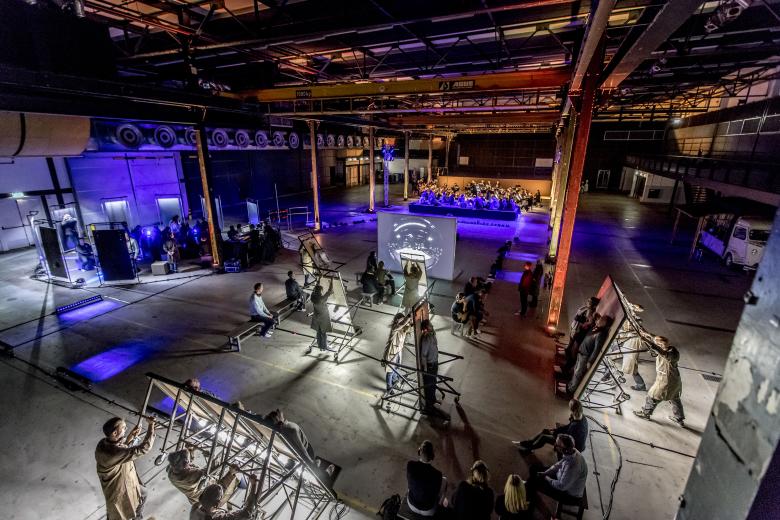
Adapting sounding heritage
Symphonic ochestras are institutions of cultural reproduction. They take care of our sounding heritage. But the decline of the classical music practice indicates that the meaning and importance of this heritage is no longer beyond dispute. How to find new ways of making classical music artistically relevant in 21st century societies? This assumes that heritage is given new uses, and is related to new contexts. This research line builds a database of initiatives taken by musical institutions to stage their products in innovative ways.
Theoretically, it relates to research on heritage conservation and creating new strategies of access to heritage. Innovative cultural dynamics often evolve around new presentations and re-enactments of the past. How can the innovation of symphonic classical music be related to the rediscovery or musical cultures of the past? Central to this research line is the notion of adaptation as a core strategy in cultural reproduction.
Lead researchers
Dr. Denise Petzold and Prof. dr. Peter Peters
Publications
Petzold, D. (2024). The 'Museum Problem' Revisited: Learning from Contemporary Art Conservation. In N. T. Smith, P. Peters, & K. Molina (Eds.), Classical Music Futures: Practices of Innovation (pp. 229-251). Open Book Publishers. https://doi.org/10.11647/obp.0353.12
Petzold, D. (2023). Archives of change: An art conservation studies approach to innovating classical music. [Doctoral Thesis, Maastricht University]. Maastricht University. https://doi.org/10.26481/dis.20230704dp
Petzold, D. (2023). Hoe leeft klassieke muziek online? de Klank. Magazine van orkest en vrienden philharmonie zuidnederland, 45.
Petzold, D. (2023). Orchestral Identities and the Formation of Musical Knowledge: A ‘Sociomaterial’ View on the Concert Programmes of the London Symphony Orchestra and the Vienna Philharmonic Orchestra. Fontes Artis Musicae, 70(3), 223-243. https://doi.org/10.1353/fam.2023.a909190
Petzold, D. (2020). Klinkend erfgoed. de Klank. Magazine van orkest en vrienden philharmonie zuidnederland, 60. https://www.maastrichtuniversity.nl/sounding-heritage
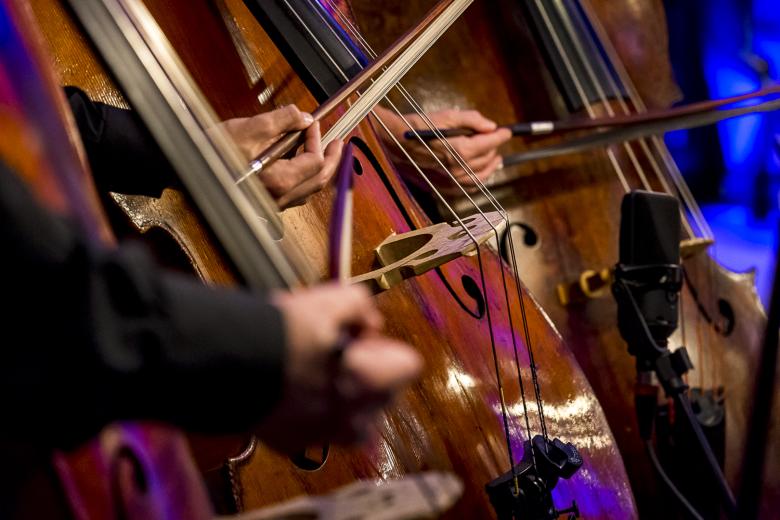
-
2022-2026: Research line 1Digital technologies in classical music
-
2022-2026: Research line 2The regional orchestra
-
2022-2026: Research line 3Innovating higher music education
-
2018-2022: Research line 1Orchestrating social relevance
-
2018-2022: Research line 2Modernising cultural participation
-
2018-2022: Research line 3Adapting sounding heritage
